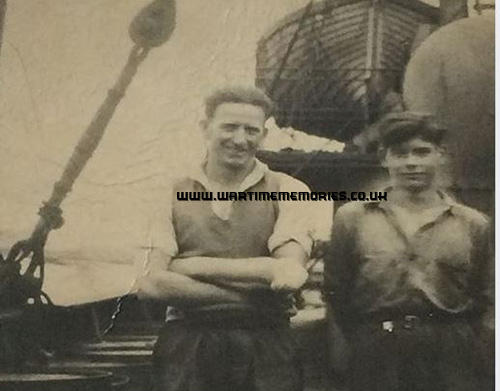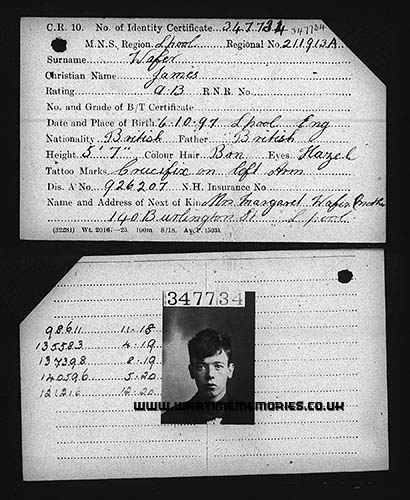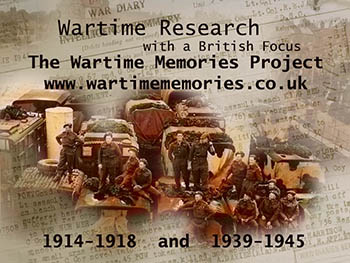|
|
|
Merchant Navy
If you can provide any additional information, please add it here.
|
|
|
The Wartime Memories Project is the original WW1 and WW2 commemoration website.
Announcements

- 1st of September 2024 marks 25 years since the launch of the Wartime Memories Project. Thanks to everyone who has supported us over this time.
- The Wartime Memories Project has been running for 25 years. If you would like to support us, a donation, no matter how small, would be much appreciated, annually we need to raise enough funds to pay for our web hosting and admin or this site will vanish from the web.
- 19th Nov 2024 - Please note we currently have a huge backlog of submitted material, our volunteers are working through this as quickly as possible and all names, stories and photos will be added to the site. If you have already submitted a story to the site and your UID reference number is higher than
264989 your information is still in the queue, please do not resubmit, we are working through them as quickly as possible.
- Looking for help with Family History Research?
Please read our Family History FAQs
- The free to access section of The Wartime Memories Project website is run by volunteers and funded by donations from our visitors. If the information here has been helpful or you have enjoyed reaching the stories please conside making a donation, no matter how small, would be much appreciated, annually we need to raise enough funds to pay for our web hosting or this site will vanish from the web.
If you enjoy this site
please consider making a donation.
Want to find out more about your relative's service? Want to know what life was like during the War? Our
Library contains an ever growing number diary entries, personal letters and other documents, most transcribed into plain text. |
|
Wanted: Digital copies of Group photographs, Scrapbooks, Autograph books, photo albums, newspaper clippings, letters, postcards and ephemera relating to WW2. We would like to obtain digital copies of any documents or photographs relating to WW2 you may have at home. If you have any unwanted
photographs, documents or items from the First or Second World War, please do not destroy them.
The Wartime Memories Project will give them a good home and ensure that they are used for educational purposes. Please get in touch for the postal address, do not sent them to our PO Box as packages are not accepted.
World War 1 One ww1 wwII second 1939 1945 battalion
Did you know? We also have a section on The Great War. and a
Timecapsule to preserve stories from other conflicts for future generations.
|
|
Want to know more about Merchant Navy? There are:75 items tagged Merchant Navy available in our Library There are:75 items tagged Merchant Navy available in our Library 
These include information on officers, regimental histories, letters, diary entries, personal accounts and information about actions during the Second World War. |
|
Frederick Levi Wyatt During the Great War Fred Wyatt served with 1st Monmouthshire Regiment and was taken prisoner in 1915 probably at 2nd Ypres. He was assaulted by a guard in 1917, bayoneted through the arm and back of head was stoved in. He was sent to Switzerland for surgery. He was sent home in 1917 and discharged.
He married in 1922 and had 3 children 1922, 25 and 33. He worked as a chef steward in the Merchant Marine. He was torpedoed and sunk in WWII.
He died of a virus in 1944, just after the birth of his 1st grandchild.
|
Kenneth Gordon Roberts SS Norman Star Kenneth Roberts sailed with the Blue Star Line on the SS Norman Star.
|
Cabin boy. Stanley Atkinson Mv Fishpool (d.14th Nov 1940) Stanley Atkinson Cabin Boy, age 18 served on the Mv Fishpool, the crew abandoned vessel after enemy air attack and was supposed drowned.
His brother William George died in the same attack.
|
Galley Boy. George William Atkinson MV Fishpool (d.14th Nov 1940) George Atkinson age 17, was a galley boy on the Mv Fishpool, Merchant Navy.
He was killed during enemy air attack on the vessel.
|
Third Off. George Edward Polson SS Sea Glory (d.11th Jul 1940) My Grandfather, George Polson was in the Merchant Navy, he was Third Officer on the SS Sea Glory (Dover) which was torpedoed and sunk SW Ireland by U 99 There were no survivors.
|
Able Sea. James Duncan Cocker Empire Pibroch My late father, James Cocker was an S.O.S. on the Empire Pibroch and is on the crew list docking at San Francisco on the 21st of January 1946.
|
William Crosbie Black MM, DCM, BEM. Reina Del Pacifico William Black was my grandfather. He was born in Ramelton in Donegal Ireland in 1880.
He was a sailor in the Mercantile Marine. He was mobilised into the Lancashire Brigade, Royal Garrison Artillery on 25th of May 1915. He received a hand written duplicate letter requiring to report to the Sefton Barracks in Upper Warwick Street together with a detailed list of personal supplies and clothing to which he would receive a gratuity of £5 on reporting for duty.
He served until 12th January 1919.
He was awarded the Pip, Squeak and Wilfred War Medals, but also awarded the DCM and Military Medal. There is a Certificate for the Gallant Act he carried out to receive the Military Medal whilst serving with the Second Army.
He also received a Mercantile Marine Medal from the Board of Trade.
In WW2 he was a Quarter Master on the Reina Del Pacifico, owned by the PSNC, which was converted into troopship. He was 59 when WW2 started. He was in many theatres of the War which included the Second Battle of Tobruk and the Invasion of Sicily.
He was awarded the Africa Star with Clasp, Atlantic Star, Italy Star, Pacific Star and Burma Star.
In the Honours List announced on 9th January 1946 he was awarded the British Empire Medal for Meritorious Service.
He ended his service on SS Orbita when his Sea Service and his War Service Certificate was issued on 29th May 1947 when he was 67.
He was a much loved father and grandfather, and died aged 82 in 1962.
|
BS. Frederick Harry Parrott Frederick Parrott served with the Merchant Navy during WW2. He died in 2020.
|
Radio Off. Robert Moses Walker My grandfather, Robert Walker was a radio officer in the Merchant Navy on a Ministry of War Transport in World War II.
|
3rd Radio Off. Brian Roy Clarke SS Sithonia Brian Clarke was third radio officer on the SS Sithonia, which was torpedoed in the mid-Atlantic on 13th of July 1942 by a German submarine U-201, commanded by Kapitanleutnant Adalbert Schnee. Most of the crew survived in two lifeboats. Brian’s lifeboat arrived in Africa two weeks later, where eventually they were taken prisoner by Vichy French authorities and sent to a POW camp near Dakar. At the end of the war, they were released and repatriated. Details of his story and survival and imprisonment were brought to public attention through his recordings (titled ‘Adrift’) on tape and CD, which are available at the Imperial War Museum. Also, the book ‘Making Shore’ was basically Brian’s true story, although it had some embellishments of a romantic nature.
|
Sea. Maurice "Ginger" Archer SS Wendover  My father, Maurice Archer (or Ginger as he was nicknamed, for his red hair) was 17 when he sailed out of Liverpool on 21st June 1940. His Merchant Navy ship, the SS Wendover, was bound for Bordeaux carrying coal on passage. France had just fallen to Germany, so orders were changed and the ship was diverted to Rio de Janeiro. On 12th July, my father celebrated his 18th birthday. On the 16th July, my father’s ship was captured at sea by a German raider. During the capture, a burly German officer turned to my father and told him "The war is over for you, son". But this was just the start of 4.5 years in captivity and in concentration camps where my father witnessed death, hunger, cold, and disease. He now tells his story:
"On the 16th July 1940, I was on 4-8 watch when according to the 8-12 watch a ship flying Yugoslav colours had opened fire from the port quarter, killing the radio operator and setting fire to the bridge. The ship turned out to be a disguised German raider. During the one-way exchange of fire (the raider kept of range), Able Seaman George Smith was seriously injured and the third engineer, Mr. Gibson, and the steward, Mr. Gernardt, were killed. George Smith died later of his injuries. After four months aboard the raider, we were transferred to a prison ship. Conditions on the raider were passable, but the prison ship was deplorable.
We landed in Bordeaux a few weeks later and were taken to the prison camp Caserne Colonial Bordeaux. This camp bordered on primitive in every sense of the word. Our first night there we had doors for beds. We weren't sorry to leave there in a cattle truck three days later, when we were taken to Drancy Prison in Paris. The less said about our stay at Drancy the better. The only good thing I remember about Drancy was the kindness of the French women who had nothing themselves, but nevertheless threw loaves of bread to us past the guards.
Most of the prisoners, including myself, were sent from Drancy to concentration camps. After five days of normal transportation (i.e., in cattle trucks), we arrived at Bremervorde in northwestern Germany near Bremen, and were then marched several miles to Stalag X-B in Sandbostel, where we were greeted by the stink of death. I was held in Stalag X-B for two years, and I will never forget that smell – it lingered constantly. Many thousands of POWs died there. In early 1945, in the face of advancing British forces, the camp was evacuated, and we were marched to Marlag und Milag Nord, from where I was later repatriated.
There have been times when I've thought about the few months of kindness and friendliness shown by Frau Wilmbrock and her family in the village of Kirch, where I and fellow Stalag X-B prisoner Jock Reid worked their farm.
Little did I know, but back home I was considered missing and presumed dead. My name was and still is on the wall of remembrance in the Mission to Seaman in South Shields."
|
JEng. Thomas Andrew "Tots" Storey (d.7th Sep 1940) Thomas Storey came from a family of nine.
His Ship was hit by a U Boat.
|
L/Bdr Norman Power Maritime Regiment Royal Artillery My late father in law was Norman Power. He served with the Royal Artillery Maritime Regiment in WW2. He was a gunner on merchant shipping on both the Atlantic and Arctic Convoys.
I remember him telling me about runs to Malta and how soldiers shouldn't have been on ships. He said he always craved the soil under his boots. He was torpedoed and sunk twice but fortunately rescued on both occasions. I remember him telling me that he was actually on his first day of a period of survivors leave when D Day commenced.
Many years later he wrote a short fictional story about a Maritime Regiment gunner who brought nothing but bad luck. The story is called The Jinx.
From things he had said prior to his death, the family believe that the story could actually be based on himself and those he served with. Whilst it is only short, it gives a vivid account of life on board ship as a RA gunner during WW2. The story was hand written and falling apart but I have typed it up for preservation.
|
AB. James Wafer S.S. Samaria (d.14th May 1943)  James Wafer started service as an Able Seaman during World War 1 and had survived active service as a teenage merchant man on a ship called Romney. He signed up in 1915 at the age of 18.
This is the story of my Grandad, James Wafer and his best friend and shipmate Matty Towers. In May 1943 S.S. Samaria was in West Huskisson dock at my grandfather's home port of Liverpool.
At 5.00 p.m. on Thursday 13th of May 1943, my grandfather Jim reported for duty on troop ship S.S. Samaria to J. Lowe 2nd officer.
At 5.10 p.m. he was assigned A.R.P. duty by S. Pentith 3rd officer.
From 10.00 a.m. 11.00 p.m. he was seen on his rounds attending to blackout by J. Lowe.
1.30 a.m. Friday 14th of May 1943 Jim Wafer was seen apparently asleep in Seaman Gunners Quarters by Able Seaman Stanley Poole. A little after 1.30 a.m. the last person to speak to Grandad was Able Seaman M. Towers.
When he talked to my Grandad he was told that he had a bad headache.
These were to be my grandfather's final words on earth.
At 8.00 a.m. Matty Towers looked in his bunk and then reported Grandad missing to the Bosun, J. Hynes. Shortly after, Samaria set sail for Algiers via the River Clyde, Glasgow. Samaria sailed out of Liverpool on Friday 14th of May 1943 and was on the Clyde Monday 17th of May.
Samaria sailed from Clyde 19th of May to Algiers and arrived 27th of May 1943.
At 6.25 p.m. Wednesday 26th of May 1943 P.C. William Gibb and Sgt Fox found my Grandad's body in the South West corner of the West Huskisson dock. Two days later the Coroner held an inquest into Grandad's death and the verdict was given as unascertainable. Thomas Coakley examined the body and states no violence was used in his death but his body was badly damaged, due to it being trapped for days under the lock gates of the dock. He listed drowning as the probable cause of death.
The funeral for 46 year old Jim Wafer was held on Tuesday 1st of June 1943 at St Dominic's Roman Catholic Church then burial at Ford Cemetery.
On the Samaria crew list and report of character, James Wafer and Matty Towers are consecutive number 59 & 60. For ability and general conduct both men are reported as very good.
By the 26th of June 1943 the crew of the Samaria had heard of the body of Jim Wafer being found in Liverpool. At 7.05 p.m. Matthew Towers A.B. (M.N. Gunner) fell from the gun platform on A deck to B deck, receiving head injuries. On being examined by the ship's surgeon life was found to be extinct.
At 7.45 p.m. the Samaria was about to sail. At this point the body of Matthew Towers A.B. was taken ashore by the military authorities for burial. On 28th of May 1943 he was buried in El Alia Cemetery Algiers.
The official record of these two mens' deaths falls so short of telling the whole story. Against J. Wafer it states "he failed to re-join ship" and for M. Towers it reads "died as result of accident". Strange that we have sworn coroners statements from my grandfather's inquest placing him on the ship and performing his duties, but the official entry in the log claims he failed to re-join the ship. The official records state the purser took possession of his discharge book, his I.D. card and his grey suit jacket.
For Matty Towers the three witness statements into his death are very contradictory. Those giving evidence included J. Cornwall M.N. Gunner, R. W. Orr D.E.M.S. Gunner and T. Moulton Sectionman. One statement indicates he fell forward unhindered over the gun deck another says he staggered, gripped a rail and fell backwards to his death. The third statement, quite surprising, from W. Orr, is missing from the official records although he is listed as giving evidence to the inquiry into Matty Towers death.
Matthew Towers was 48 years old when he lost his life.
|
Recomended Reading.Available at discounted prices.
|
|
|








